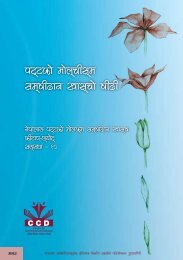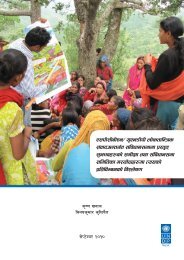The Dalits of Nepal and a New Constitution - ConstitutionNet
The Dalits of Nepal and a New Constitution - ConstitutionNet
The Dalits of Nepal and a New Constitution - ConstitutionNet
You also want an ePaper? Increase the reach of your titles
YUMPU automatically turns print PDFs into web optimized ePapers that Google loves.
<strong>The</strong> <strong>Dalits</strong> <strong>of</strong> <strong>Nepal</strong> <strong>and</strong><br />
a <strong>New</strong> <strong>Constitution</strong><br />
45<br />
Recasting Justice: Securing Dalit Rights<br />
in <strong>Nepal</strong>'s <strong>New</strong> <strong>Constitution</strong><br />
- Center for Human Rights <strong>and</strong> Global Justice<br />
Introduction<br />
<strong>The</strong> Center for Human Rights <strong>and</strong> Global Justice (CHRGJ)<br />
at <strong>New</strong> York University has kindly allowed us to include<br />
the summary which follows <strong>of</strong> their recent publication,<br />
Recasting Justice: Securing Dalit Rights in the <strong>New</strong><br />
<strong>Constitution</strong> (2008). 62 This is the result <strong>of</strong> a very<br />
thorough project <strong>of</strong> study <strong>of</strong> the Interim <strong>Constitution</strong>,<br />
<strong>and</strong> also <strong>of</strong> the situation <strong>of</strong> <strong>Dalits</strong> in <strong>Nepal</strong> –which was<br />
the subject <strong>of</strong> an earlier CHRGJ report <strong>The</strong> Missing Piece<br />
<strong>of</strong> the Puzzle: Caste Discrimination <strong>and</strong> the Conflict in<br />
<strong>Nepal</strong> (2005) 63 . This new report was launched by Jagaran<br />
Media Center in <strong>Nepal</strong> in April 2008 <strong>and</strong> it will be<br />
translated into <strong>Nepal</strong>i.<br />
We are very pleased to be able to broaden the range <strong>of</strong><br />
people having access to this publication. Following<br />
discussion with the CHRGJ, we make the following small<br />
number <strong>of</strong> comments:<br />
1. After the recent exercise in distributing citizenship<br />
certificates (2007) more <strong>Dalits</strong> have the certificates<br />
to which they are entitled. We would suggest that<br />
there are two issues here: the new <strong>Constitution</strong><br />
should make it clear that citizenship <strong>and</strong> the<br />
evidence <strong>of</strong> it in the form <strong>of</strong> citizenship certificates<br />
are a right. Separately, it is wrong to give rights<br />
only to citizens unless there is very good reason<br />
(such as the right to vote) (see page 2).<br />
2. <strong>The</strong> objective <strong>of</strong> the suggestion that the Constituent<br />
Assembly should “Ensure that the new constitution’s<br />
equivalent to Article 23(2) contains a similar clause<br />
prohibiting the encroachment on the religious rights<br />
<strong>of</strong> others” is to ensure that <strong>Dalits</strong>, like others, are<br />
able to exercise their religious rights such being<br />
able to enter temples. So it should be read together<br />
with other recommendations including the<br />
immediately preceding suggestion to “Prohibit the<br />
use <strong>of</strong> religion to encroach upon all fundamental<br />
rights <strong>and</strong> freedoms <strong>of</strong> others” <strong>and</strong> the suggestion<br />
on page 10 to “Include language that explicitly<br />
prohibits exploitation in the name <strong>of</strong> religion” –<br />
because <strong>of</strong> the risk that some people would argue<br />
that their religious rights (e.g. as a Brahmin) includes<br />
treating <strong>Dalits</strong> as inferior (see page 7). So in the<br />
new <strong>Constitution</strong> it should be clear which principle<br />
is dominant (<strong>and</strong> that principle is the dignity <strong>of</strong> all).<br />
3. While we would agree that the inclusion <strong>of</strong><br />
economic social <strong>and</strong> cultural rights in the Interim<br />
<strong>Constitution</strong> is to be welcomed (see pages 8-9),<br />
we would note that these rights are weakened by<br />
the provision that most <strong>of</strong> them are “according to<br />
law” (Article 16(2) on basic health services, Article<br />
17 on education, <strong>and</strong> Article 18 on social security,<br />
while the right to property (Article 19) it is subject<br />
to the existing law). <strong>The</strong> new constitution must<br />
use these sorts <strong>of</strong> formulations only when strictly<br />
necessary <strong>and</strong> provide for the new <strong>Constitution</strong> to<br />
be as much as possible “self-executing”, <strong>and</strong><br />
include provisions that ensure that other<br />
implementing steps actually take place. It took 17<br />
years for the Right to Information Act to be passed<br />
(<strong>and</strong> 12 years after the Supreme Court ordered<br />
that a law be passed) – people should not have to<br />
wait so long for the new <strong>Constitution</strong> to be<br />
implemented.<br />
62<br />
<strong>The</strong> full report, Center for Human Rights <strong>and</strong> Global Justice, Recasting Justice: Securing Dalit Rights in <strong>Nepal</strong>’s <strong>New</strong> <strong>Constitution</strong> (<strong>New</strong> York: NYU School <strong>of</strong> Law, 2008), is<br />
available on their website at http://www.chrgj.org/projects/docs/recastingjustice.pdf.<br />
63<br />
<strong>The</strong> full report, Center for Human Rights <strong>and</strong> Global Justice, <strong>The</strong> Missing Piece <strong>of</strong> the Puzzle: Caste Discrimination <strong>and</strong> the Conflict in <strong>Nepal</strong> (<strong>New</strong> York: NYU School <strong>of</strong> Law,<br />
2005), is available on their website at http://www.chrgj.org/docs/Missing%20Piece%20<strong>of</strong>%20the%20Puzzle.pdf.


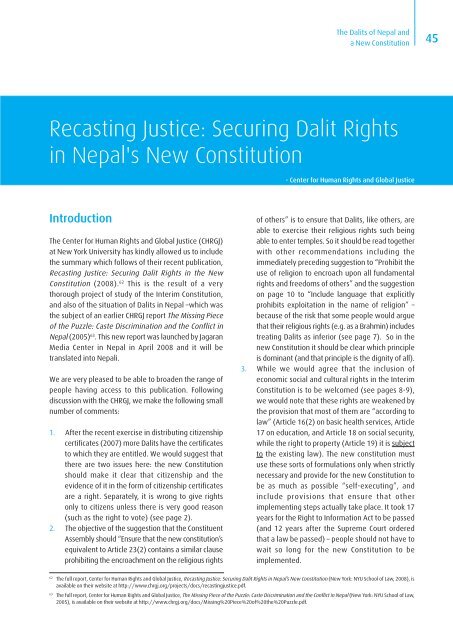

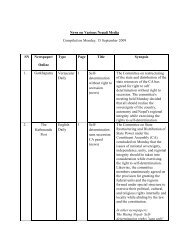

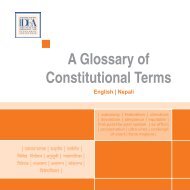
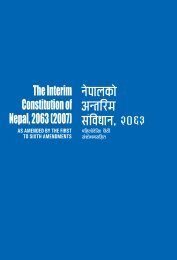
![g]k fnsf blntx? / gofF ;+l jwfg](https://img.yumpu.com/49483602/1/184x260/gk-fnsf-blntx-goff-l-jwfg.jpg?quality=85)
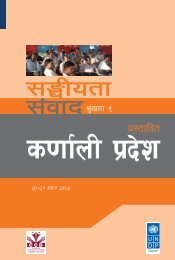
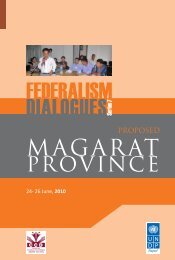
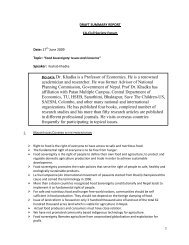
![+ljwfg;ef, /fHosf]k'g](https://img.yumpu.com/41604075/1/184x260/-ljwfgef-fhosfkg.jpg?quality=85)
